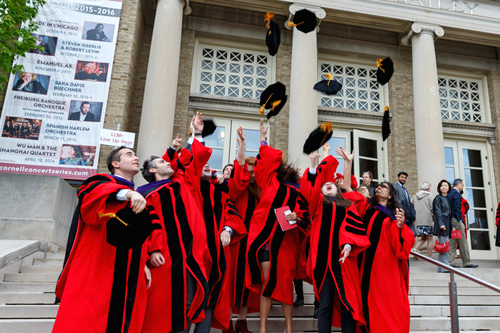This website uses cookies
We use cookies to ensure that we give you the best experience on our website. If you continue to use this site we will assume that you are happy with it.
On May 15, the Cornell Law School class of 2016 met in Bailey Hall for its final convocation. Graduates and their guests were greeted by Eduardo M. Peñalver, Allan R. Tessler Dean and Professor of Law, who delivered the opening address.
 Peñalver acknowledged the increasing prominence of automation and outsourcing in the legal field but asserted that lawyering will continue to call for uniquely human creativity, wisdom, and judgment. “I’m not ready to surrender to our new robot overlords just yet,” he said. He also addressed the current political ferment in the United States, which, he said, displays the fragility of democracy, and which makes Cornell’s radical and progressive mission of excellent and inclusion more important than ever.
Peñalver acknowledged the increasing prominence of automation and outsourcing in the legal field but asserted that lawyering will continue to call for uniquely human creativity, wisdom, and judgment. “I’m not ready to surrender to our new robot overlords just yet,” he said. He also addressed the current political ferment in the United States, which, he said, displays the fragility of democracy, and which makes Cornell’s radical and progressive mission of excellent and inclusion more important than ever.
Peñalver also took a moment to recognize Law School student Arlen Cohen, who had been forced to take a leave of absence after he was assaulted and seriously injured while studying abroad in Cape Town, South Africa. Cohen was in attendance at Bailey Hall, and his classmates gave him a standing ovation.
J.D. speaker Andrew Michael Karp exhorted his peers to confront their own feelings about the cases they will handle as lawyers. “The doctrine is important,” he said, “but the doctrinal voice is incomplete unless colored by who we are. Never, ever be afraid to raise your moral voice even louder.”
L.L.M. speaker Mohammad Usman Piracha shared some wisdom imparted to him by a refugee he had befriended while working as a human rights officer in south Asia: Knowledge is powerful, but it can also entrench its bearers in their own points of view. He observed, “Sometimes, to become lawyers in the best sense, and bring about change . . . we have to be the first to change, ourselves.”
The 2016 convocation speaker was Barbara J. Holden-Smith, vice dean and professor of law. Holden-Smith, who has been a faculty member since 1990 and is recognized for her groundbreaking work in Supreme Court history and practice, was chosen to speak by the graduating class.
Holden-Smith used her speech to highlight some continuing problems that call out for the intervention of dedicated lawyers, problems including racial inequality, environmental degradation, poverty, and the mistreatment of immigrants.
She concluded, “I believe that we must solve these problems because we can. We are the richest nation in the history of the world, and we have the collective talents forged by cultures from all over the globe to do so. I believe that we must solve these problems because it is right and it is just. The ideals upon which our country was founded, ideals later redefined after the Civil War, demand that we do. I believe that we will solve these problems, because I have faith in America. That faith comes from many sources, one of which is you, the young, the members of the Millennial generation, which I think may prove to be the greatest generation so far.”
Following Holden-Smith’s speech, Markeisha Miner, dean of students, recognized the graduates individually before convocation attendees adjourned to the Myron Taylor Hall courtyard for a reception.